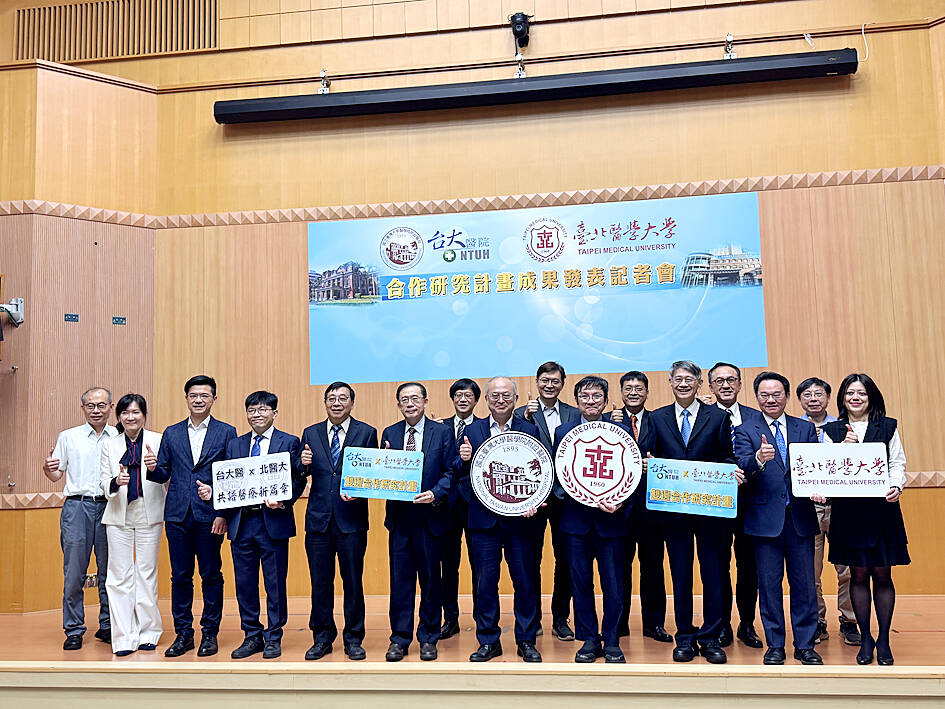Taipei Medical University (TMU) and National Taiwan University Hospital (NTUH) yesterday announced two research breakthroughs related to precision medical care of liver cancer and chronic kidney disease.
They said at a news conference that they have been collaborating on several projects on precision medical care for liver cancer and kidney diseases, citing that there are more than 90,000 people who are on dialysis in Taiwan.
NTUH superintendent Wu Ming-shiang (吳明賢) said the two hospitals have strong research capacity, so their collaboration can achieve highly effective results.

Photo: Chiu Chih-jou, Taipei Times
That many of the studies were conducted by interdisciplinary or even multinational medical teams shows the strength of Taiwan’s precision medicine to the world, Wu said.
Taiwan historically had a high prevalence of hepatitis B, with carrier rates reaching about one-fifth of the population and many affected by the “hepatitis-cirrhosis-liver cancer” disease progression, NTUH Department of Internal Medicine attending physician Tsai Feng-chiao (蔡丰喬) said.
While vaccination and increased early screening have reduced virus-induced liver cancer cases, metabolic disorders and fatty liver disease continue to pose a serious health threat, Tsai said.
As effective treatment options are limited, some medical teams are looking to develop personalized diagnostic and therapeutic strategies based on a person’s cancer etiology, he said.
Tsai said their team, led by NTUH vice superintendent Kao Jia-horng (高嘉宏) and in partnership with TMU, employed multiomics techniques to investigate variations in the genome, transcriptome and kinome across liver cancer patients.
Their findings explained tumor heterogeneity and its implications for disease progression and treatment response, NTUH said.
Meanwhile, NTUH hepatologist Su Tung-hung (蘇東弘) analyzed a large hepatitis B patient database to identify single nucleotide polymorphisms associated with virus-induced liver cancer, the hospital said.
TMU assistant professor Chang Ching-wen researched how immune microenvironments surrounding tumor cells influence cancer growth and therapeutic outcomes through integrative genomic and transcriptomic profiling, it said.
The joint effort has led to the creation of a comprehensive liver cancer tumor database, which could accelerate the identification of personalized biomarkers and support the realization of precision liver cancer care, it said.
Furthermore, through high-throughput experiments and artificial intelligence analysis, the team developed a “gene interference plus drug inhibition” platform and identified two promising combination therapies which were validated using TMU clinical patient data, it said.
Although the discoveries are not ready for clinical application, they mark major milestones in cancer therapy research, it added.

The manufacture of the remaining 28 M1A2T Abrams tanks Taiwan purchased from the US has recently been completed, and they are expected to be delivered within the next one to two months, a source said yesterday. The Ministry of National Defense is arranging cargo ships to transport the tanks to Taiwan as soon as possible, said the source, who is familiar with the matter. The estimated arrival time ranges from late this month to early next month, the source said. The 28 Abrams tanks make up the third and final batch of a total of 108 tanks, valued at about NT$40.5 billion

Two Taiwanese prosecutors were questioned by Chinese security personnel at their hotel during a trip to China’s Henan Province this month, the Mainland Affairs Council (MAC) said yesterday. The officers had personal information on the prosecutors, including “when they were assigned to their posts, their work locations and job titles,” MAC Deputy Minister and spokesman Liang Wen-chieh (梁文傑) said. On top of asking about their agencies and positions, the officers also questioned the prosecutors about the Cross-Strait Joint Crime-Fighting and Judicial Mutual Assistance Agreement, a pact that serves as the framework for Taiwan-China cooperation on combating crime and providing judicial assistance, Liang

A group from the Taiwanese Designers in Australia association yesterday represented Taiwan at the Midsumma Pride March in Melbourne. The march, held in the St. Kilda suburb, is the city’s largest LGBTQIA+ parade and the flagship event of the annual Midsumma Festival. It attracted more than 45,000 spectators who supported the 400 groups and 10,000 marchers that participated this year, the association said. Taiwanese Designers said they organized a team to march for Taiwan this year, joining politicians, government agencies, professionals and community organizations in showing support for LGBTQIA+ people and diverse communities. As the first country in Asia to legalize same-sex

MOTIVES QUESTIONED The PLA considers Xi’s policies toward Taiwan to be driven by personal considerations rather than military assessment, the Epoch Times reports Chinese President Xi Jinping’s (習近平) latest purge of the Chinese People’s Liberation Army (PLA) leadership might have been prompted by the military’s opposition to plans of invading Taiwan, the Epoch Times said. The Chinese military opposes waging war against Taiwan by a large consensus, putting it at odds with Xi’s vision, the Falun Gong-affiliated daily said in a report on Thursday, citing anonymous sources with insight into the PLA’s inner workings. The opposition is not the opinion of a few generals, but a widely shared view among the PLA cadre, the Epoch Times cited them as saying. “Chinese forces know full well that